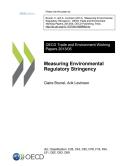This paper discusses the results of a study of measuring green growth in the Benelux countries (Belgium, The Netherlands and Luxembourg). The study paid particular attention to the challenges of measuring the transition to a low-carbon economy in cross-border areas as they have additional levels of complexity when it comes to measuring and monitoring their low-carbon transition.
In cross- regions, data collection hardly ever coincide with any single data gathering ‘institution’. Moreover, Belgium (Flanders, Brussels, Wallonia), the Netherlands, and Luxembourg have different indicator systems at the national level, and even more so at the more decentralised level which creates problems of data availability, data (in)consistency, and hence comparability.

The book includes case studies from Hannover (Germany), Auckland (New Zealand), Flanders (Belgium), Western Canada, City of Raleigh (United States), and Kyoto (Japan).
Bringing together 35 contributions from over 60 experts from research, the private sector, international organisations and local governments worldwide, ICLEI’s compendium bridges the gap between the global promotion of the concept and its actual realisation on the ground by illustrating the advantages of the Green Urban Economy approach with concrete and practical examples.
By embedding both economic and environmental concerns in policymaking, the compendium calls for smarter approaches and innovation in applying existing tools and new methods towards achieving sustainable urban development. Covering issues such as governance, economics, new business models, green jobs, technology, infrastructure, urban poverty, it is also an acknowledgement of and call for more locally responsive actions, new thinking and research.
The book includes case studies from Hannover (Germany), Auckland (New Zealand), Flanders (Belgium), Western Canada, City of Raleigh (United States), and Kyoto (Japan).
